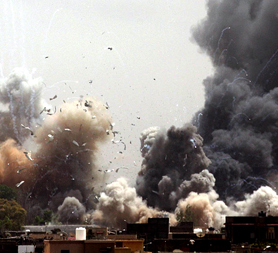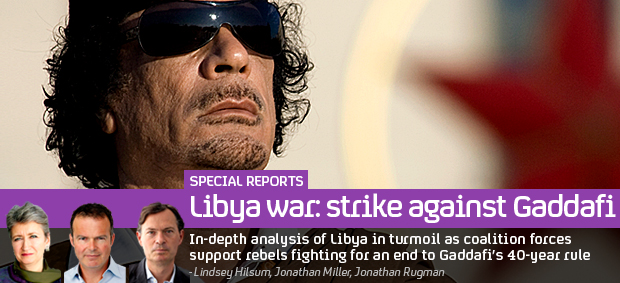Libya: Gaddafi’s troops advance on Misrata
NATO’s call to ramp up the bombing campaign in Libya falls on deaf ears, as thousands of Colonel Gaddafi’s troops attack the rebel-held city of Misrata.

In an appeal to Britain’s NATO neighbours, UK Defence Secretary Liam Fox said: “We want to see increased urgency in some quarters in terms of Libya“.
Of the 28 NATO allies only eight, led by Britain and France, have been conducting air strikes against Gaddafi’s forces, and a senior US official warned this week that fatigue was beginning to set in among the air crews already committed.
Both Spain and Germany continue to refuse to take part in strike missions, with Germany’s Deputy Defence Minister Christian Schmidt confirming: “Germany sticks to its position, no military engagement.”
Meanwhile, Norway is in the process of scaling down its air strike role in preparation to end its commitment on 24 June, and non-NATO member Sweden announced plans today to cut the number of fighter jets from eight to five.
Sweden added that it would switch the role of its jets from patrolling no-fly zones to carrying out reconnaissance sorties.
NATO appealed for contributions to “our common efforts”, as Colonel Gaddafi’s troops advanced on Misrata. However, no new commitments to air strikes have been made, according to a NATO diplomat who said: “Nobody responded to the demands to do more.”
Moving on Misrata
Ten rebel fighters were killed today and dozens wounded after Colonel Gaddafi’s forces shelled Misrata from three sides.
Rebel spokesman Hassan al-Misrati told Reuters from inside the town: “He has sent thousands of troops from all sides and they are trying to enter the city. They are still outside, though. We have lost 10 rebels and 26 wounded, most of them are critically wounded.”
I wouldn’t be surprised if NATO was there (in Libya) for years. Christopher Schnaubelt, NATO Defence College
The offensive follows a lull in the NATO bombing of Tripoli on Wednesday, after 24 hours of some of the heaviest bombardments of the Libyan capital since air strikes began in March.
NATO maintains that the bombing aims to protect civilians from Colonel Gaddafi’s forces. But critics have accused NATO of going beyond its UN mandate to protect civilians, pointing to UK Foreign Secretary William Hague, who has spoken of forcing Gaddafi out.
Underestimating the difficulties
While no NATO country has pledged to step up air strikes, western diplomats are lining up behind the rebels. Spain, for example, has said it recognises Libya’s National Transitional Council as the country’s only “legitimate representative of the Libyan people”.
Yet Christopher Schnaubelt of the NATO Defence College in Rome said most of the NATO countries involved “have vastly underestimated the difficulties and I don’t think they anticipated how long this would drag out”.
“I don’t see them increasing the capacity of the rebels to enable them to defeat Gaddafi’s forces in centres of power like Tripoli any time soon, so I wouldn’t be surprised if NATO was there for years.
“I think it’s 50-50 whether we end up in a frozen conflict and de facto partition of Libya, with Gaddafi controlling part of it and the rebels the other.”
NATO Secretary General Anders Fogh Rasmussen said the international community must begin planning to ensure a peaceful transition after Gaddafi quits.
He said he did not see a lead role for NATO after it had fulfilled its UN-mandated mission to protect civilians, and the alliance had no plans to send ground troops as part of a post-Gaddafi stabilisation force.
-
Latest news
-
‘Russian aggressions have never pushed Georgia to deviate from its own path’, says Georgian President5m

-
Why is Georgia’s ruling party so intent on adopting ‘foreign influence’ bill?5m

-
Trump’s lawyers try to paint Michael Cohen as liar out for revenge at trial3m

-
England’s schools told not teach gender identity2m

-
Slovakia PM shooting: Suspect charged with attempted murder3m

-





